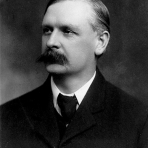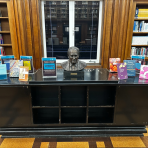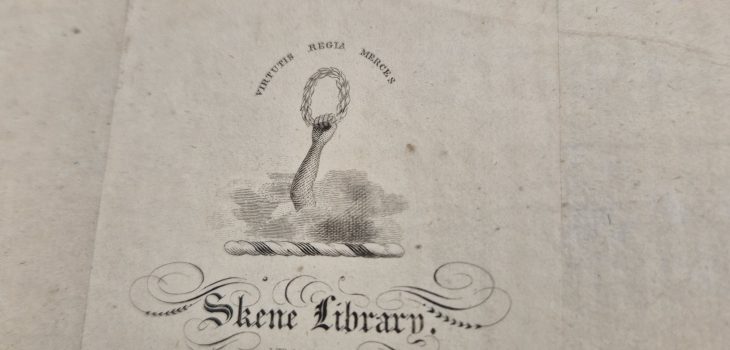One of our current projects in the Collections Team is going through our historical collections and enhancing the catalogue records so that they conform to modern standards for rare books. One aspect of this process are the fields on the records relating to the provenance of the book in question. Where there is sufficient evidence, we can make entries to show former owner(s) of the copy in question. Such evidence may include bookplates, ink stamps and written annotations.
A recent example is this book which is part of the Reece Collection:
Fuller, Thomas. Exanthematologia : Or, an Attempt to Give a Rational Account of Eruptive Fevers, Especially of the Measles and Small Pox. In Two Parts. … To Which Is Added, an Appendix Concerning Inoculation, [&c.]. London: Printed for Charles Rivington, 1730. Print.
The bookplate indicated this had once been owned by the Skene Library. But what and where is this library? The Library of Congress Authority file – a thesaurus of controlled terms for names and subjects – had no such heading.
A Google search for “Skene Library bookplate” led me to an image of an almost identical bookplate on an auction site, which had the description “Skene Library, Aberdeen”. I contacted the University of Aberdeen Special Collections to see if they could provide more information. The bookplate carries the classmark P.2.19 which tallies with manuscript catalogues of this library from 1848 and 1850 held in the University of Abderdeen Special Collections.
The Skene Library was a private collection housed in Skene House (also known as Skene Castle), Aberdeenshire, ancestral home of the Skene of Skene family. The house and estates passed into the possession of the Earls of Fife in 1887. Shortly after this we see evidence of some books from the Skene Library being offered for auction, a copy of the auction catalogue being held at the Warburg Institute:
https://search.worldcat.org/title/1000804855
It is not clear whether our copy was acquired by Reece at auction or via some other method (private sale, bequest).
When I was researching this, I first came across the website of the Skene Memorial Library in upstate New York. This library was established by the wife of the late Dr Alexander Skene, American Civil War Surgeon and Gynaecologist, to serve the communities of Griffin Corners (now called Fleishmanns), with the help of a donation from industrialist Andrew Carnegie, on a model known as a Library Association (essentially a trust or Board). This library is very much still with us, although it seems funding is somewhat perilous. It seemed to me unlikely, though not impossible, that this library ever owned Fuller’s work. Below is a link to their website.
https://www.skenelib.org/the-skene-memorial-library-history/










